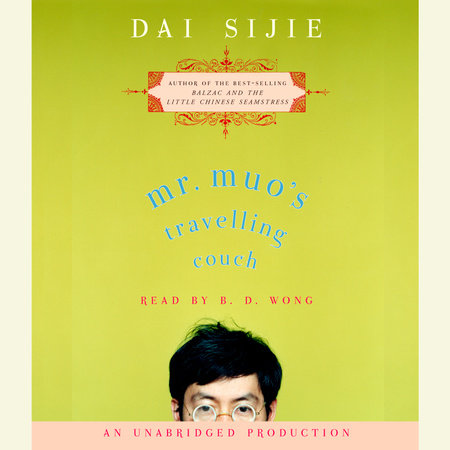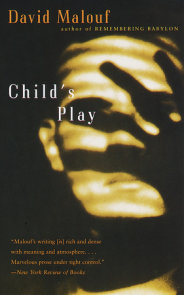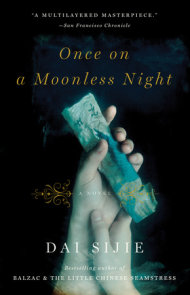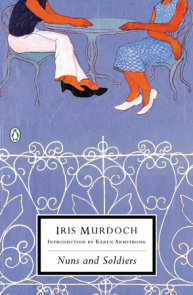READERS GUIDE
“Fans of Dai Sijie’s Balzac will adore this enchanting adventure story.” —Chicago TribuneThe introduction, discussion questions, suggestions for further reading, and author biography that follow are intended to enhance your group’s conversation about Mr. Muo’s Travelling Couch, Dai Sijie’s imaginative work about the lengths we go to in pursuit of love.
Introduction
For this second novel, Dai Sijie has invented a most fantastic, yet profoundly enlightening, quest set in modern China. Mr. Muo is a forty-year-old scholar and devotee of Freud who leaves France and returns to his native China to free his college love from prison. He must procure a virgin for the corrupt and sadistic Judge Di so that the Judge will pardon the woman for whom, as it turns out, Muo has harbored an essentially unreciprocated love for twenty years. This wild premise is just the starting point for Muo’s—and the reader’s—even more wild and superbly entertaining adventure across the Chinese countryside. While he scours the country for a virgin, Muo determines to practice the teachings of Freud by offering low-cost dream interpretation to the Chinese people he encounters along the way. But Muo is a novice in dream interpretation as well as in the ways of love. The results of his encounters with the Chinese women, are, therefore, laden with awkwardness, embarrassment, and, occasionally, absurdity—both in his interpretation of their dreams and in his investigation into their purity. Along the way, Muo attracts the love of an ugly older policewoman, loses his virginity to his long-time friend and neighbor, and, when he finally meets a young virgin for Judge Di, finds himself, inevitably, falling in love with her himself. No obstacle deters Muo from his quest. He battles an array of colorful and sometimes frightening Chinese characters, including the savage hill bandits (Lolo), corrupt judges and politicians, convict restaurateurs, an herbalist who observes panda droppings, and the peasants who submit to Muo’s amateur psychoanalysis.Through Muo’s expedition, Sijie spares no detail. Embellishing his acute insight into human behavior with madcap humor, Sijie philosophizes on the capricious nature of love, the confused state of modern China, and dream interpretation as a way of understanding the human state. His creation—Mr. Muo—is a tribute to supreme optimism and the tenaciousness of the individual spirit.
Questions and Topics for Discussion
1. Sijie explicitly compares Muo to Cervantes’s famous knight, Don Quixote. Upon Muo’s rejection of a shop girl’s overtures, Sijie writes, “Had she insisted, had she pled for the sake of her business or her family, had she played the damsel in distress, it might have ended quite differently for Muo the incorruptible, Muo the true, Muo the knight in shining armour! Invoking the name of his own Dulcinea, he pictured her in his mind as he pedaled along the bumpy road just ahead of his dream-logo banner” [p. 96]. How is Muo’s quest Quixotic? What else does Muo seek besides a virgin as he traverses China?
2. Is Muo an unlikely hero? Is he a believable character? What are his strengths and weaknesses? Muo often does unpredictable, strange things, such as his acrobatics when he visits Judge Di’s chambers [p. 74], or when, as a boy, he shoved a whole egg into a storyteller’s mouth [p. 83]. What makes him act like this? Is he comical?
3. As the motivation for Muo’s journey, Volcano of the Old Moon is a key figure in the novel. However, like Muo’s parents, she only appears in Muo’s memories and other recollections. How does their absence reinforce the themes of the novel? Do these characters belong to a different world from Muo or the other characters with whom he becomes entangled?
4. Why does The Embalmer seem to disappear from the novel and, apparently, Muo’s thoughts after he sleeps with her?
5. Is Muo a reliable reporter on the nature of love? What is the nature of his love for each of the four women he claims he “truly loves” [p. 276]? Muo thinks that his dream about Volcano of the Old Moon’s pregnancy and her prison cell being invaded by a firing squad was, “In Freudian terms . . . a sign of ‘the beginning of the end of love’” [p. 280]. What does this mean?
6. Describing psychoanalysis as one would a religion, Muo cries, “Revelations, confessions, emotional apocalypse! Ah, the power of psychoanalysis!” [p. 95]. What is it about Freud’s writings and teachings that appeals to Muo? What power does he think lies in understanding dreams?
7. Why are all the provincial people in Chapter 6, “A Movable Couch,” so eager to have their dreams interpreted? How do they react to Muo’s interpretation of their dreams? Are their reactions what Muo expected or hoped for?
8. Muo begins his quest with doubts about his faith in Freud: “Ever since setting foot in China, Muo, the most doctrinaire of disciples, has faced looming doubts about his psychoanalytic vocation. . . . He looks for orthodox answers in his psychoanalytic texts, but when he finds the answers, they seem only more outlandish here, in his true home. Nothing disconcerts him more than the prospect of renouncing his calling” [pp. 84–5]. What about being in China makes his faith in Freud waver? Does Muo lose his faith in Freud completely by the end of his quest?
9. Toward the end of the novel, Muo concludes, “No one can truly comprehend a dream. But not even artists, a breed apart, understand the meaning of dreams. They merely create them, live them and end up as the dreams of others” [p. 281]. How are the creations of artists—including books—like dreams? If books are like dreams, and dreams cannot be interpreted, what is Sijie implying about the ability of the reader to understand a book?
10. In the chapter entitled, “The Sea Cucumber,” Sijie describes in exhaustive detail the food that Judge Di consumes [p. 257]. For what is food a metaphor? How are the physical appetites and desires of the characters different from their spiritual desires? Do these different desires intersect or overlap?
11. “How China has changed!” Muo observes on the train ride home [p. 9]. The China of Muo’s youth was the China governed by Mao Tse-Tung and his Great Cultural Revolution. Evidence of the Great Cultural Revolution is still very much present in the landscape of China, from the fields of execution [p. 59] to the denunciations collected by the Stork in the basement of the courthouse [p. 199]. What can the reader surmise is Sijie’s opinion of the Cultural Revolution? What is the state of post-Cultural Revolutionary China as viewed by the now-Westernized Mr. Muo?
12. Muo thinks, “Now Fate had decreed that Judge Di should be the one to spur him on to resume his old quest, driving him to realize the old ideals concretely, with a proper balance of revolutionary romance and proletarian realism, as Mao would have wished. Nowadays, great leaps forward are par for the course in the communist world, but that hardly makes Mao’s leap less great” [p. 277]. Is Dijie’s homage to Mao Tse-Tung sincere? Is Muo as much—or more—a product of Mao Tse-Tung’s Communist China as he is a disciple of Freud? Is Muo’s true home in China or France?
13. In a passage about Judge Di’s successes, Sijie writes, “Some years later, when his life was all sunshine (not thanks to the rays cast by the Great Helmsman, despite the song sung by billions of his countrymen for half a century—‘The sky reddens in the East. The sun rises. It is he, Mao, our president . . . ’—but rather to the sun rising in West, the sun of capitalism in the communist mode)” (p. 259). Is there other evidence of capitalism’s influence on the modern China to which Muo returns? How has China reconciled this capitalistic influence with its communistic state?
14. Is there a distinctive “Chinese” personality that is different from a Western personality? How are the Chinese men portrayed compared to the Chinese women in the novel? Are their dreams different?
15. Muo compares the self-denunciations collected by The Stork from the Great Cultural Revolution to “confessional novels” [p. 200]. What do each of these types of confessions have in common with the central motif of the novel: the sharing of ones dreams? Are politicians, Freud, Muo, and the reader all equally duped by their own mistaken conviction of their ability to understand the dreams of another?
16. Sijie employs an original narrative style and different devices to relay the events of the novel and to convey Muo’s inner thoughts. For example, he relates Muo’s bout in the insane asylum through a newspaper article [p. 66], Muo’s experiences with the girls in the domestic workers’ market through first-person entries in his “psychoanalytic workbook” [p. 107], and Muo’s adventures with the Lolo through a letter from Muo to Volcano of the Old Moon [p. 214]. Does Sijie’s style add another dimension to the novel or detract from its plot? Does it reinforce the themes of the novel?
17. Sijie also inserts himself occasionally as an instructive narrator: “Here it must be remembered that whatever the faults of Muo’s conduct of his own life, however crushing his ignorance, in matters of psychoanalysis, particularly as applied to the domain of dreams, his knowledge was vast and unimpeachable” [p. 90]. Is this narrator sincere or sarcastic? How does this testament to Muo’s knowledge affect the reader’s faith in Muo or ability to sympathize with him?
18. Sijie is also a filmmaker. How does the artistic viewpoint of a filmmaker manifest itself in the landscape that Muo traverses—both the physical landscape of China and the landscape of human experience and emotion? Does the viewpoint of a filmmaker affect the tone of the novel or the presentation of ideas?
About this Author
Dai Sijie was born in the Fujian province of China and was sent away from his parents (“bourgeois doctors’”) to be “re-educated” during the Chinese Cultural Revolution in 1966–1971. When Mao Tse-Tung died in 1976, the twenty-two-year-old Sijie applied to the University of Arts and was awarded a grant to study abroad. He has lived and worked in France since 1984.Sijie’s first novel, Balzac and the Little Chinese Seamstress, was published in France in 2000 and spent twenty-three weeks on the New York Times bestseller list, winning five literary prizes. Dai Sijie is also a filmmaker with four films to his credit: Chine, ma douleur (1989), Le Mangeur de Lune (1993), The Eleventh Child (1998), and Balzac and the Little Chinese Seamstress (2002).






















